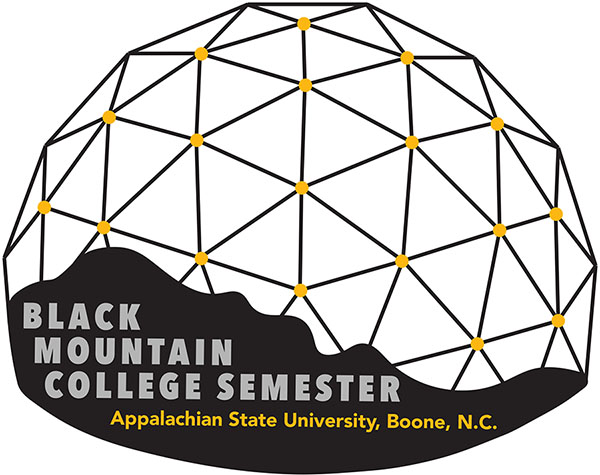BOONE, N.C.—For Appalachian State University’s Black Mountain College (BMC) Semester in spring 2018, multiple departments across the university are collaborating with area museums and other venues to host exhibits, lectures and workshops that will highlight the importance of BMC’s influence within the Appalachian region’s creative, educational and political movements.
Black Mountain College operated from 1933 to 1957 near Asheville, in North Carolina’s rural Swannanoa Valley, and was an early leader of progressive, experimental education in the 20th century.
Led by the Center for Appalachian Studies, Professor of Creative Writing and North Carolina Poet Laureate Emeritus Joseph Bathanti and the Turchin Center for the Visual Arts, and with support from the College of Arts and Sciences and Academic Affairs, the Black Mountain College Semester in spring 2018 addresses the legacy of BMC through three interrelated projects:
- a multisited exhibition series;
- a special Black Mountain College issue of Appalachian Journal guest edited by Joseph Bathanti, in collaboration with Appalachian Journal Editor-in-Chief Sandra Ballard and Savannah Paige Murray, featuring prominent voices associated with BMC;
- and a multipurpose digital timeline containing a museum guide, original scholarly resources, and curricular materials designed for North Carolina schools.
A semester-long series of lectures, readings, workshops, film screenings and special courses on Black Mountain College invite public education and academic inquiry, extended by web streaming and online archiving. Importantly, a cross section of students and faculty at Appalachian will contribute to the project’s research and exhibition assets in the mold of collaborative learning at BMC.
According to Bathanti, influential writers, visual artists, dancers, designers and music composers instilled in their students and colleagues many of the same values upheld by Appalachian today: learning by doing, collaborative learning, and education for social justice and democracy.
Not only a mecca of the arts, Bathanti said, “Black Mountain produced some of America’s most profound innovators in education, science, social work, architecture, urban planning, psychiatry, history and politics. All of those who passed through the college were encouraged to become citizens of social consciousness who put into daily practice a creative freedom in judgment and action.”
One of the first happenings will take place Oct. 19 – 20 on Sanford Mall. Set up for a geodesic dome workshop begins at 9 a.m. From 10 a.m. to 1 p.m., Kurt Pryzbilla will assist students in building geodesic domes. Buckminster Fuller, an American architect, systems theorist, author, designer and inventor who was a key figure at BMC, named the geodesic dome designed after World War I by Walther Bauersfeld, based on field experiments with artist Kenneth Snelson at BMC in 1948 and 1949.
Director of the Center for Appalachian Studies William Schumann said the domes will be constructed from bamboo gathered in September in Todd, then stored for events scheduled during the BMC semester. The public is invited to observe and participate.
In March 2018, the Turchin Center for the Visual Arts will host “Creative Democracy: The Legacy of Black Mountain College,” featuring a selection of art and artifacts from Black Mountain College artists and writers. Other exhibits will open as early as November at Blowing Rock Art & History Museum (BRAHM), Belk Library and Information Commons, and the Swannanoa Valley Museum & History Center.
During its existence, many of the nation’s greatest thinkers and artists were in residence or paid visits to Black Mountain College, including Anni Albers, Josef Albers, John Cage, Merce Cunningham, John Dewey, Albert Einstein, Aldous Huxley, Willem de Kooning, Buckminster Fuller, Paul Goodman, Langston Hughes, Zora Neale Hurston, Franz Kline, Jacob Lawrence, Henry Miller, Robert Motherwell, Charles Olson, Arthur Penn, Francine du Plessix-Gray, Robert Rauschenburg, Aaron Siskind and many others.
About the Center for Appalachian Studies
The Center for Appalachian Studies promotes public programs, community collaboration, civic engagement and scholarship on the Appalachian region. The center is committed to building healthy communities and deepening knowledge of Appalachia’s past, present and future through community-based research and engagement. Learn more at https://appcenter.appstate.edu.
About Appalachian State University
As a premier public institution, Appalachian State University prepares students to lead purposeful lives. App State is one of 17 campuses in the University of North Carolina System, with a national reputation for innovative teaching and opening access to a high-quality, cost-effective education. The university enrolls more than 21,000 students, has a low student-to-faculty ratio and offers more than 150 undergraduate and 80 graduate majors at its Boone and Hickory campuses and through App State Online. Learn more at https://www.appstate.edu.
What do you think?
Share your feedback on this story.




![How NCInnovation Is Rethinking Economic Development in North Carolina [faculty featured]](/_images/_posts/2026/02/rethinking-economic-development-600x400.jpg)







